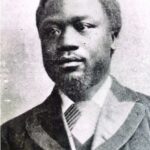BANNERMAN, C. E. W.
- 3 Min Read
Charles Edward Woolhouse Bannerman (October 12, 1884-November 10, 1943) was the first African to become a judge of the Supreme Court of the Gold Coast.
Born in James Town, Accra, in 1884, he was the youngest of the three sons of Samuel Bannerman, who was himself a magistrate, a district commissioner, and a member of both the Executive and Legislative Councils of the Gold Coast.
Woolhouse Bannerman had his early education in Accra, after which he served as a clerk in the law office of his uncle, Thomas Hutton Mills. In 1911 he went to Nigeria, and worked for the colonial administration of Old Calabar, where he became a chief clerk. He left for Britain to study law in 1913 and was called to the Bar at the Middle Temple in London in 1915. He returned to the Gold Coast the same year and practised before the Supreme Court until July 1919.
He took an active part in public affairs, and he and Dr. F. V. Nanka-Bruce became joint secretaries of the projected West African Conference, which in 1920 became the National Congress of British West Africa. Before the conference was held, however, Bannerman was appointed a police magistrate in the Supreme Court. This brought his active participation in the nationalist movement to an end.
His appointment to a post usually reserved for Europeans coincided with the agitation by educated Africans after World War I (1914-18) for Africans to be appointed to the higher ranks of the colonial administration in the Gold Coast. Bannerman’s appointment, like that of Dr. C.E. Reindorf as temporary medical officer, was therefore one that was welcomed by the local press, even though the appointment was not at the highest level, and had a lower salary than it would have had for a European.
Woolhouse Bannerman served as a police magistrate for 15 years, and during that period acted as puisne judge on seven occasions. But because colonial policy at that time was that Africans should not be judges; it was not until September 1934 that he was promoted circuit judge for Asante and the Northern Territories. At that time these territories had their own judicial systems, and lawyers were not allowed to practise in their courts. Finally, in July 1935, Bannerman was promoted puisne judge of the Supreme Court, which was then composed of the Chief Justice and four puisne judges.
It was the persistent claim of educated Africans that they were competent to hold posts up to then reserved for Europeans. Bannerman, as the first African judge, was therefore faced with a personal challenge in proving this claim to be justified. He was able to do so during his tenure of office, demonstrating integrity, ability, and a high sense of responsibility.
During his career he received many decorations, including the Order of the British Empire (O.B.E.) in 1924, the King George V Silver Jubilee Medal (1935), and the King George VI Coronation Medal (1937). He was a member of the Church of England. He died in 1943.
J.O. VANDERPUYE





